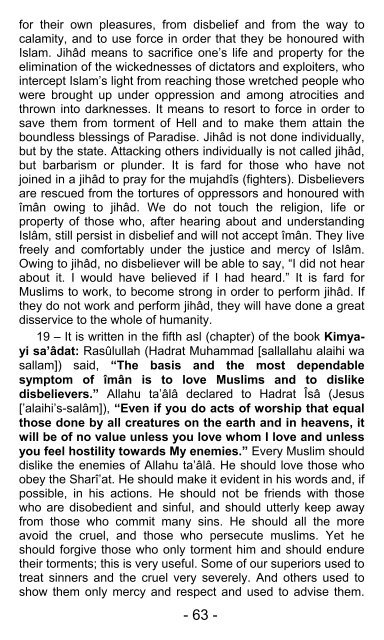1 - Endless Bliss - Hüseyin Hilmi Işık
1 - Endless Bliss - Hüseyin Hilmi Işık
1 - Endless Bliss - Hüseyin Hilmi Işık
You also want an ePaper? Increase the reach of your titles
YUMPU automatically turns print PDFs into web optimized ePapers that Google loves.
for their own pleasures, from disbelief and from the way to<br />
calamity, and to use force in order that they be honoured with<br />
Islam. Jihâd means to sacrifice one’s life and property for the<br />
elimination of the wickednesses of dictators and exploiters, who<br />
intercept Islam’s light from reaching those wretched people who<br />
were brought up under oppression and among atrocities and<br />
thrown into darknesses. It means to resort to force in order to<br />
save them from torment of Hell and to make them attain the<br />
boundless blessings of Paradise. Jihâd is not done individually,<br />
but by the state. Attacking others individually is not called jihâd,<br />
but barbarism or plunder. It is fard for those who have not<br />
joined in a jihâd to pray for the mujahdîs (fighters). Disbelievers<br />
are rescued from the tortures of oppressors and honoured with<br />
îmân owing to jihâd. We do not touch the religion, life or<br />
property of those who, after hearing about and understanding<br />
Islâm, still persist in disbelief and will not accept îmân. They live<br />
freely and comfortably under the justice and mercy of Islâm.<br />
Owing to jihâd, no disbeliever will be able to say, “I did not hear<br />
about it. I would have believed if I had heard.” It is fard for<br />
Muslims to work, to become strong in order to perform jihâd. If<br />
they do not work and perform jihâd, they will have done a great<br />
disservice to the whole of humanity.<br />
19 – It is written in the fifth asl (chapter) of the book Kimyayi<br />
sa’âdat: Rasûlullah (Hadrat Muhammad [sallallahu alaihi wa<br />
sallam]) said, “The basis and the most dependable<br />
symptom of îmân is to love Muslims and to dislike<br />
disbelievers.” Allahu ta’âlâ declared to Hadrat Îsâ (Jesus<br />
[’alaihi’s-salâm]), “Even if you do acts of worship that equal<br />
those done by all creatures on the earth and in heavens, it<br />
will be of no value unless you love whom I love and unless<br />
you feel hostility towards My enemies.” Every Muslim should<br />
dislike the enemies of Allahu ta’âlâ. He should love those who<br />
obey the Sharî’at. He should make it evident in his words and, if<br />
possible, in his actions. He should not be friends with those<br />
who are disobedient and sinful, and should utterly keep away<br />
from those who commit many sins. He should all the more<br />
avoid the cruel, and those who persecute muslims. Yet he<br />
should forgive those who only torment him and should endure<br />
their torments; this is very useful. Some of our superiors used to<br />
treat sinners and the cruel very severely. And others used to<br />
show them only mercy and respect and used to advise them.<br />
- 63 -




